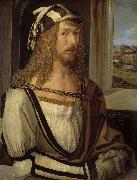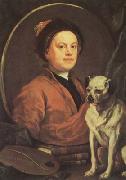
|
Albrecht Durer
|
|||
|
|
|||
| b.May 21, 1471, Imperial Free City of Nernberg [Germany] d.April 6, 1528, Nernberg Albrecht Durer (May 21, 1471 ?C April 6, 1528) was a German painter, printmaker and theorist from Nuremberg. His still-famous works include the Apocalypse woodcuts, Knight, Death, and the Devil (1513), Saint Jerome in his Study (1514) and Melencolia I (1514), which has been the subject of extensive analysis and interpretation. His watercolours mark him as one of the first European landscape artists, while his ambitious woodcuts revolutionized the potential of that medium. D??rer introduction of classical motifs into Northern art, through his knowledge of Italian artists and German humanists, have secured his reputation as one of the most important figures of the Northern Renaissance. This is reinforced by his theoretical treatise which involve principles of mathematics, perspective and ideal proportions. His prints established his reputation across Europe when he was still in his twenties, and he has been conventionally regarded as the greatest artist of the Renaissance in Northern Europe ever since. | |||
|
|
|||
|
Self-portrait (mk08) new6/Albrecht Durer-599776.jpg Painting ID:: 21354 |
1498 Oil on wood 52x41cm Madrid,Museo del Prado | ||
|
|
|||
|
REMBRANDT Harmenszoon van Rijn
|
|||
|
|
|||
| Born 1606, Died 1669.One of the great Dutch painters and printmakers of the 17th century, Rembrandt van Rijn is best known for his expressive use of light and shadow (also called chiaroscuro) in his many portraits. Raised in Leiden, he studied with Pieter Lastman (1583-1633) in Amsterdam, then returned to Leiden around 1625 and set up shop as a teacher and portrait artist. Sometime between 1630 and 1632 Rembrandt relocated to Amsterdam, where he spent the rest of his career. Though he had his detractors (some of whom considered him coarse and "low born"), Rembrandt was successful and famous during his lifetime, though he fell on financial hard times in his later years. He was a master printer and produced hundreds of group portraits and historical paintings, including The Anatomy Lesson of Dr. Tulp (1632), The Military Company of Captain Frans Banning Cocq (1642) and Aristotle with a Bust of Homer (1653). His portraits -- including a lifelong trail of intriguing and rather frank self-portraits -- reveal his interest in psychological study and continue to be admired as landmarks in Western art. The Military Company of Captain Frans Banning Cocq is also known as "The Night Watch" because it was thought the painting depicted a nighttime scene. When the painting was cleaned in the 1940s it became obvious that it depicted a daytime scene... He married Saskia van Ulenburgh (also Uylenburgh) in 1634. | |||
|
|
|||
|
Self-portrait (mk08) new6/REMBRANDT Harmenszoon van Rijn-499993.jpg Painting ID:: 21655 |
1658 Oil on canvas 133.5x104cm New York,The Frick Collection | ||
|
|
|||
|
LA TOUR, Maurice Quentin de
|
|||
|
|
|||
| French Rococo Era Painter, 1704-1788 French pastellist. He was one of the greatest pastellists of the 18th century, an equal of Jean-Simeon Chardin and Jean-Baptiste Perronneau. Unlike them, however, he painted no works in oils. Reacting against the stately portraits of preceding generations and against the mythological portraits of many of his contemporaries, La Tour returned to a more realistic and sober style of work. The fundamental quality of his art lies in his ability to suggest the temperament and psychology of his subjects by means of their facial expression, and thereby to translate their fugitive emotions on to paper: 'I penetrate into the depths of my subjects without their knowing it, and capture them whole', as he himself put it. His considerable success led to commissions from the royal family, the court, the rich bourgeoisie and from literary, artistic and theatrical circles. | |||
|
|
|||
|
Self-Portrait (mk08) new7/LA TOUR, Maurice Quentin de-622552.jpg Painting ID:: 21901 |
1751 Pastel 64.5x53cm Amiens,Musee | ||
|
|
|||
|
KAUFFMANN, Angelica
|
|||
|
|
|||
| Swiss Neoclassical Painter, 1741-1807 Swiss-born Italian painter. She began studying art in Italy as a child, showing great precocity, and in 1766 her friend Joshua Reynolds took her to London. There she became known for her decorative work with architects such as Robert Adam. Her pastoral compositions incorporate delicate and graceful depictions of gods and goddesses; though her paintings are Rococo in tone and approach, her figures are Neoclassical (see Classicism and Neoclassicism). Her portraits of female sitters are among her finest works. | |||
|
|
|||
|
Self-portrait (mk08) new7/KAUFFMANN, Angelica-862895.jpg Painting ID:: 21928 |
1780 Oil on canvas 130x102cm Frankfurt am Main, Goethe-Museum | ||
|
|
|||
|
HOGARTH, William
|
|||
|
|
|||
| British Painter and Printmaker, 1697-1764 English painter and engraver. He played a crucial part in establishing an English school of painting, both through the quality of his painting and through campaigns to improve the status of the artist in England. He also demonstrated that artists could become independent of wealthy patrons by publishing engravings after their own paintings. | |||
|
|
|||
|
Self-portrait (mk08) new7/HOGARTH, William-547769.jpg Painting ID:: 21931 |
1745 Oil on canvas 90.2x69.8cm London,Tate Gallery | ||
|
|
|||
|
Also Buy::. For Following Paintings / Artists / Products, Please Use Our Search Online: |












